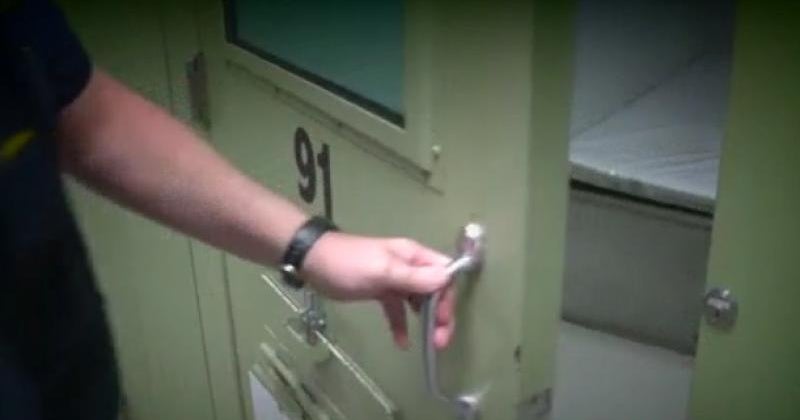Program That Accepted Rice Rare In Domestic Cases
GEOFF MULVIHILL, Associated Press
SEAN CARLIN, Associated Press
TRENTON, N.J. (AP) — The offender-rehabilitation program former Baltimore Raven Ray Rice was allowed into after knocking his fiancee unconscious in an Atlantic City elevator is rarely used in domestic assault cases — but whether that means he got special treatment because of his stardom remains up in the air, depending on whom you ask.
Only 70 of the more than 15,000 domestic violence assault cases adjudicated from 2010 to 2013 in New Jersey's Superior Court were admitted into the pretrial intervention program, according to records obtained by The Associated Press. The program, known as PTI, allows suspects to avoid incarceration and keep their records clean if they meet agreed-upon requirements.
Video released by TMZ Sports last week shows Rice punching Janay Rice, at the time his fiancee and now his wife, in the face and knocking her unconscious Feb. 15 at Revel Casino Hotel.
Advocates for victims of domestic violence have accused investigators of being too lenient on Rice, and lawmakers have called for a review. Defense attorneys and experts disagree about whether his stardom led to leniency, with some saying Rice's fame, if anything, gave the case more scrutiny.
Rice was initially suspended for two games but was released by the Ravens and barred indefinitely by the NFL after the video from inside the elevator was released last week and league Commissioner Roger Goodell drew criticism for the earlier punishment.
More than half of the 15,000 total domestic violence cases were dismissed or referred to lower-level municipal courts. Rice's case started out in municipal court, but county prosecutors took over the case after the release of the February video. Rice pleaded not guilty, and prosecutors signed off on his request to be placed into the PTI program, which is available only in state Superior Court.
Cases are often downgraded or dismissed because the alleged victims do not want to go ahead with charges, said Sandy Clark, associate director of the New Jersey Coalition for Battered Women. That is the case with Janay Rice, who married Ray Rice a day after a grand jury indicted him.
Under terms of his PTI, Rice agreed to pay $125 in fines and receive anger management counseling.
Simple assault charges are far more frequent in domestic violence cases than the more serious aggravated assault charge Rice received, Clark said.
"With third-degree aggravated assault, I would like to think those do not wind up being dismissed," Clark said.
Rice's case appears to have been handled more harshly, in fact, because of his fame, according to New Jersey defense attorney James Leonard Jr. and John C. Lore III, a professor at Rutgers School of Law in Camden. Two other defense attorneys said that Rice's celebrity could have played a role in the case getting more legal attention.
Leonard Jr. said that the case should have remained in a municipal court — where, if it had, it stood a better chance of being thrown out altogether.
"It's irresponsible for people to suggest that the courts and the prosecutors turn a blind eye," he said. "Those cases are reviewed very, very thoroughly."
Rice's attorney did not return a message left after business hours Monday but said earlier that his client was an excellent candidate for the program.
"He's just a high-character individual," attorney Michael Diamondstein said. "He's a good guy."
New Jersey guidelines advise that those who commit violent crimes should "generally be rejected" from the program, but Atlantic County Prosecutor Jim McClain, who handled the case, says he signed off on it after reviewing the circumstances and consulting with Janay Rice.
She indicated through her lawyer this year that she did not want the case to proceed. She has supported her husband and criticized his indefinite suspension by the NFL.
McClain has declined the AP's interview requests. But he has defended Rice's entry into the diversion program and told The Press of Atlantic City that Rice likely would have received probation rather than the three to five years in jail the charge allows for if he were convicted at trial.
"Just like it is not just or fair to go easier on somebody because of who they are, neither is it fair or just to go heavier on somebody because of who they are," McClain told the newspaper. "I felt, and still feel, this disposition was appropriate."
The intervention program is seen as a key tool as the state tries to keep low-level suspects out of jail.
Defendants can have charges dismissed if they meet all conditions of the pretrial intervention. Conditions can include random urine monitoring, community service, and restitution. PTI supervision averages from one to three years, according to the state.
Of the 15,029 people charged with assault in domestic violence cases from 2010 to 2013, 8,203 had their cases dismissed or downgraded to a lower court, according to the data provided by the state judiciary. Nearly 3,100 pleaded guilty, 13 were found guilty at trial and nine were found not guilty.
The data were first reported last week by ESPN. They do not break down the charges by level of offense, so it is not clear how other cases charged as third-degree crimes were handled.
New Jersey should perform more complex assessments of cases, Clark said, including assessing how dangerous suspects are, even if it means going against the victim's wishes in some cases.
Some lawmakers have called for reviews of the handling of the Rice case specifically and whether it is appropriate to use PTI in such cases, but the state attorney general's office has not said whether it will conduct one.
Gov. Chris Christie would not discuss the handling of Rice's case but defended the intervention program generally, calling it line with the goal of keeping nonviolent suspects and offenders out of jail.
People who commit domestic violence can be rehabilitated, and more cases should probably go into pretrial diversion programs than to trial, said John Hamel, a San Francisco-based social worker who founded the Association of Domestic Violence Intervention Providers.
But most domestic violence cases involve pushing or shoving, or maybe throwing an object, Hamel noted. The level of violence in the Rice video — in which Janay Rice lost consciousness — was so extreme that Hamel believes the NFL player should have been dealt with more harshly.
"It looked like she was moving toward him to hit him or something," Hamel said. "He could have grabbed her, but he knocked her out."
___
Carlin reported from Philadelphia. Follow Mulvihill at http://www.twitter.com/geoffmulvihill .
(© Copyright 2014 The Associated Press. All Rights Reserved. This material may not be published, broadcast, rewritten or redistributed.)







